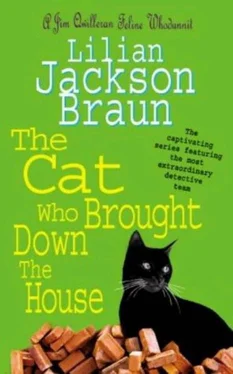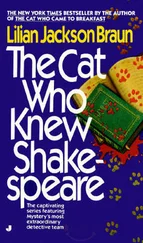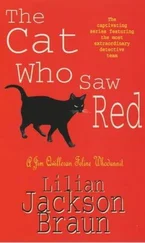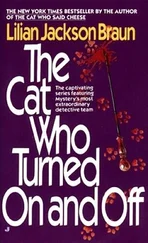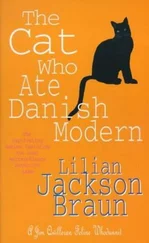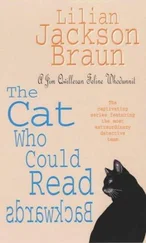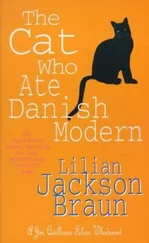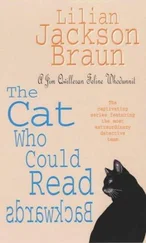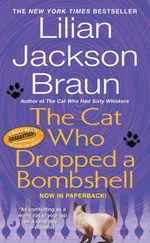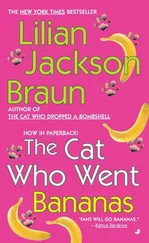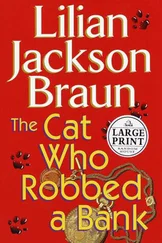Lilian Braun - The Cat Who Brought Down the House
Здесь есть возможность читать онлайн «Lilian Braun - The Cat Who Brought Down the House» весь текст электронной книги совершенно бесплатно (целиком полную версию без сокращений). В некоторых случаях можно слушать аудио, скачать через торрент в формате fb2 и присутствует краткое содержание. Год выпуска: 2003, ISBN: 2003, Издательство: Jove, Жанр: Старинная литература, на английском языке. Описание произведения, (предисловие) а так же отзывы посетителей доступны на портале библиотеки ЛибКат.
- Название:The Cat Who Brought Down the House
- Автор:
- Издательство:Jove
- Жанр:
- Год:2003
- ISBN:9780515136555
- Рейтинг книги:4 / 5. Голосов: 1
-
Избранное:Добавить в избранное
- Отзывы:
-
Ваша оценка:
- 80
- 1
- 2
- 3
- 4
- 5
The Cat Who Brought Down the House: краткое содержание, описание и аннотация
Предлагаем к чтению аннотацию, описание, краткое содержание или предисловие (зависит от того, что написал сам автор книги «The Cat Who Brought Down the House»). Если вы не нашли необходимую информацию о книге — напишите в комментариях, мы постараемся отыскать её.
The Cat Who Brought Down the House — читать онлайн бесплатно полную книгу (весь текст) целиком
Ниже представлен текст книги, разбитый по страницам. Система сохранения места последней прочитанной страницы, позволяет с удобством читать онлайн бесплатно книгу «The Cat Who Brought Down the House», без необходимости каждый раз заново искать на чём Вы остановились. Поставьте закладку, и сможете в любой момент перейти на страницу, на которой закончили чтение.
Интервал:
Закладка:
When my grandfather, Matthew King, inherited the farm, he claimed that blueberries occupied more acreage than did corn and potatoes. He said, “Wild blueberries can’t be cultivated, but they can’t be killed, either.” So he gave the berries away to anyone who cared to pick them. Grandma King said she lay awake nights, thinking of ways to use them in family meals: a handful of blueberries here, a handful of blueberries there. The perfect blueberry pie recipe that she masterminded is in my security box at the bank.
By the time my father inherited the property, the family was involved in producing, packaging, marketing, and shipping blueberry products. He was jocularly called the Blueberry King, and friends launched a frivolous campaign to change the name of the area to Blueberry County. Their slogan: “When was the last time you saw a Moose?”
Finally my brothers and I were bequeathed the blueberry empire, but we were interested in careers of our own. We sold out to the large Toodle family, who developed the property in various ways, including a supermarket with extensive parking and loading facilities. They carry excellent produce from all parts of the country. Included are the large cultivated berries that I put in muffins, pancakes, soups, salads, stews, and Grandma King’s blueberry pie. Considering my blueberry heritage, it seems ironic that I now buy the berries in eight-ounce boxes … No matter. There is a postscript to the tale.
The supermarket has had constant trouble with the parking lot. Asphalt buckled. Concrete cracked. One day Grandma Toodle showed me the latest damage. Shrubs were pushing up in the wide cracks.
“What do you think they are?” she asked.
“I know what they are!” I said. “Nothing can stop the incredible Moose County blueberries”
Qwilleran turned off the recorder and said, “Mildred, millions of people wouldn’t believe that blueberries could wreck a parking lot... but I do!”
On Monday morning Koko was huddled over his plate, concentrating on his food, when he suddenly turned his head to the side and listened for a few seconds before returning his attention to the business at hand. Moments later, he turned again, and the telephone rang.
It was a welcome call from Thornton Haggis, the Art Center’s volunteer man-of-all-work. He said, “Mildred told me yesterday that you bought a wall hanging and it’s okay to take it before the show ends. I could drive it up there and hang it for you right now.”
Qwilleran said, “Best news I've had since Amanda was elected mayor. I have a stepladder. What else do you need?”
“Nothing. I have all the tools and know all the tricks for hanging textiles”
“Then come along. I'll start the coffeemaker.”
The Siamese were excited when they saw the stepladder come out of the broom closet, and saw a car moving up the lane that seldom knew traffic, and saw a white-haired man approaching the barn with a big roll of something under his arm.
“Where do we hang it?” were Thornton’s first words. “Above the fireplace, covering the holes.”
“It won’t cover! It’s a vertical.”
“Just hang it horizontally.”
The expert unrolled the hanging on the floor and studied it from all angles. “Why not?” was his decision. “But we won’t tell the artist.”
After the deed was done and the result admired, the men sat at the snack bar for coffee and some sweet rolls from the freezer.
“Terrific rolls! Where’d you get them?” Thornton asked.
“From a woman in Fishport who sells home-bakes.”
“I know her. She and her husband reported a missing person last summer and got all that unfavorable publicity. A shame! Nice folks, the Hawleys. He’s a commercial fisherman, semi-retired.”
Thornton knew everyone in the county, past and present.
They talked about the Sesquicentennial and the Haggis Monument Works, purveyor of gravestones for a century and a half
“My forebears chiseled some outlandish inscriptions in the early days, and I photograph them whenever I find them.”
“You should write a book,” Qwilleran suggested. “I'm sure the K Fund would publish it. I'll buy the first copy.”
“Do you think the restored opera house has anything to do with the Sesquicentennial, Qwill? I have a hunch it’s going to be the big event of the celebration, and that’s why they’re being so secretive.”
If so, Qwilleran thought, and if it was Hixie’s idea, something dire will happen! Not wanting to be a doom-sayer, he changed the subject casually after a brief pause: “Where do you get your hair cut, Thorn?”
“When my wife lets me get it cut, I go to Bob the Barber, which isn’t very often; she likes the Zulu look.”
Bob the Barber did business in a curious old building on Main Street. It was set back a few feet from its neighbors, and steps led down from the sidewalk to a small patio at basement level. Here there was a park bench, a potted tree, and an old revolving barber pole.
One could look through a large window and see how many customers were waiting.
Qwilleran said, “You don’t often see a barber pole anymore, especially one that revolves. I've often wondered about the significance of the spiral red-and-white pole.”
Thornton was a history buff and the right one to ask. He said, “In the Middle Ages there were barber-surgeons who did bloodletting with leeches. They hung bandages on a pole outside their shop to advertise the services. The colors on the barber pole that evolved were red for blood, white for bandages, blue for veins.”
“Sorry I asked,” Qwilleran said.
A haircut was on his schedule for Monday, a day that was usually not busy. When he walked down the steps to the barbershop, he discovered that other customers had the same idea. Through the large window he could see both barber chairs occupied and several customers waiting in the row of folding chairs against the wall. A man in overalls, a feed cap, and field boots was leaving the shop. He said, “Can’t wait... too slow. Young Bob broke his thumb.”
“Cutting hair?” Qwilleran asked.
He could see Old Bob working at the first chair and Young Bob, with a splint on his left hand, at the second chair.
“Playin’ softball,” the farmer said. “He can wiggle his fingers some, but... too slow... too slow. Ain’t got time.”
Among those who had time to wait were an agricultural agent, a storekeeper, and a lecturer at the community college. Burgess Campbell, blind from birth, was accompanied by his guide dog, Alexander.
The two men played their usual charade.
Qwilleran said, “Professor Moriarty! Are you here for a haircut or a bloodletting?”
“My friend Sherlock!” he replied. “Did you bring your violin?”
“Shouldn’t you be in the lecture hall, professor?”
“Not until one o’clock. When are you going to audit one of my lectures?”
“What’s this week’s topic?”
“Geopolitical Machinations in the Nineteenth Century.”
“I'll wait till next week,” Qwilleran said.
Old Bob whipped the sheet off his customer and said, “Either of you two jokers ready to be clipped?”
Qwilleran said to Burgess, “You go first. I want to look at the bulletin board.”
“All I need is a trim. You can have the chair in... two shakes of a lamb’s tail.” His emphasis on the last phrase was a pointed reference to the “Qwill Pen.”
There was a wall of cork near the entrance, where customers were welcome to post their business cards: Bill’s Bump Shop, Main Street Flowers, Tipsy’s Tavern, and the like. But interspersed with the legitimate cards were computer printouts that local wags contributed:
TRAFFIC TICKETS FIXED—CHEAP
FALSE IDS—WHILE U WAIT
TAX-EVASION SERVICE—TOP-QUALITY ADVICE
Читать дальшеИнтервал:
Закладка:
Похожие книги на «The Cat Who Brought Down the House»
Представляем Вашему вниманию похожие книги на «The Cat Who Brought Down the House» списком для выбора. Мы отобрали схожую по названию и смыслу литературу в надежде предоставить читателям больше вариантов отыскать новые, интересные, ещё непрочитанные произведения.
Обсуждение, отзывы о книге «The Cat Who Brought Down the House» и просто собственные мнения читателей. Оставьте ваши комментарии, напишите, что Вы думаете о произведении, его смысле или главных героях. Укажите что конкретно понравилось, а что нет, и почему Вы так считаете.
